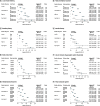Association between genetic risk and adherence to healthy lifestyle for developing age-related hearing loss
- PMID: 38532472
- PMCID: PMC10964689
- DOI: 10.1186/s12916-024-03364-5
Association between genetic risk and adherence to healthy lifestyle for developing age-related hearing loss
Abstract
Background: Previous studies have shown that lifestyle/environmental factors could accelerate the development of age-related hearing loss (ARHL). However, there has not yet been a study investigating the joint association among genetics, lifestyle/environmental factors, and adherence to healthy lifestyle for risk of ARHL. We aimed to assess the association between ARHL genetic variants, lifestyle/environmental factors, and adherence to healthy lifestyle as pertains to risk of ARHL.
Methods: This case-control study included 376,464 European individuals aged 40 to 69 years, enrolled between 2006 and 2010 in the UK Biobank (UKBB). As a replication set, we also included a total of 26,523 individuals considered of European ancestry and 9834 individuals considered of African-American ancestry through the Penn Medicine Biobank (PMBB). The polygenic risk score (PRS) for ARHL was derived from a sensorineural hearing loss genome-wide association study from the FinnGen Consortium and categorized as low, intermediate, high, and very high. We selected lifestyle/environmental factors that have been previously studied in association with hearing loss. A composite healthy lifestyle score was determined using seven selected lifestyle behaviors and one environmental factor.
Results: Of the 376,464 participants, 87,066 (23.1%) cases belonged to the ARHL group, and 289,398 (76.9%) individuals comprised the control group in the UKBB. A very high PRS for ARHL had a 49% higher risk of ARHL than those with low PRS (adjusted OR, 1.49; 95% CI, 1.36-1.62; P < .001), which was replicated in the PMBB cohort. A very poor lifestyle was also associated with risk of ARHL (adjusted OR, 3.03; 95% CI, 2.75-3.35; P < .001). These risk factors showed joint effects with the risk of ARHL. Conversely, adherence to healthy lifestyle in relation to hearing mostly attenuated the risk of ARHL even in individuals with very high PRS (adjusted OR, 0.21; 95% CI, 0.09-0.52; P < .001).
Conclusions: Our findings of this study demonstrated a significant joint association between genetic and lifestyle factors regarding ARHL. In addition, our analysis suggested that lifestyle adherence in individuals with high genetic risk could reduce the risk of ARHL.
Keywords: Age-related hearing loss; Environmental factor; Genetic risk; Lifestyle; Polygenic risk score.
© 2024. The Author(s).
Conflict of interest statement
The authors declare that they have no competing interests.
Figures


References
-
- Organization WH. World report on hearing. World Health Organization; 2021.
-
- Gates GA, Mills JH. Presbycusis. Lancet. 2005;366:1111–1120. - PubMed
-
- Dalton DS, Cruickshanks KJ, Klein BE, Klein R, Wiley TL, Nondahl DM. The impact of hearing loss on quality of life in older adults. Gerontologist. 2003;43:661–668. - PubMed
Publication types
MeSH terms
Grants and funding
LinkOut - more resources
Full Text Sources
Research Materials

